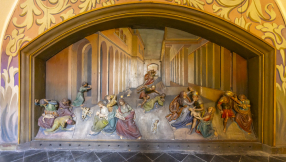A clampdown on Christianity in Morocco has led to the repeat arrests of Christians, Aid to the Church in Need reports.
Jawad Elhamidy, president of the Moroccan Association of Rights and Religious Liberties, told Catholic charity Aid to the Church in Need (ACN) that converts to the faith were being arrested up to three times a week.
During police interrogations, they report experiencing harassment and coming under pressure to abandon their Christian faith. When they refuse, they face abuse.
In some cases, police have also threatened their spouses and children with arrest, Elhamidy said.
Christians accused of blasphemy report being subjected to violence and held by police for several days.
Morocco only recognises two faiths - Islam and Judaism. Foreign Christians living in the country can freely worship according to their faith, but not indigenous Moroccans.
"The penal code holds that all Moroccans are Muslims, so those who convert to Christianity face legal problems, beside threats to their security," Elhamidy said.
He told of one Muslim convert to Christianity in Al Hajeb city, who was threatened with death by his employer. When he complained to the police, they told him not to speak about his conversion.
Then six months later, after an argument with his employer, he was arrested and sentenced to six months in prison.
Indigenous Christians form a tiny minority in Morocco, accounting for only around 8,000 out of the country's total population of 34.6 million.
Converts to Christianity often have to worship in secret house churches to avoid harassment and state sanctions, Elhamidy said.
Even foreign pastors are reluctant to permit Moroccans into their churches for fear of being charged by the police with proselytism, he continued.
"If a Moroccan enters a church, one of two things can happen – either a policeman sitting in front of the church arrests him or her, or the cleric in charge of the church asks the person to leave, unless the purpose is tourism," he said.













